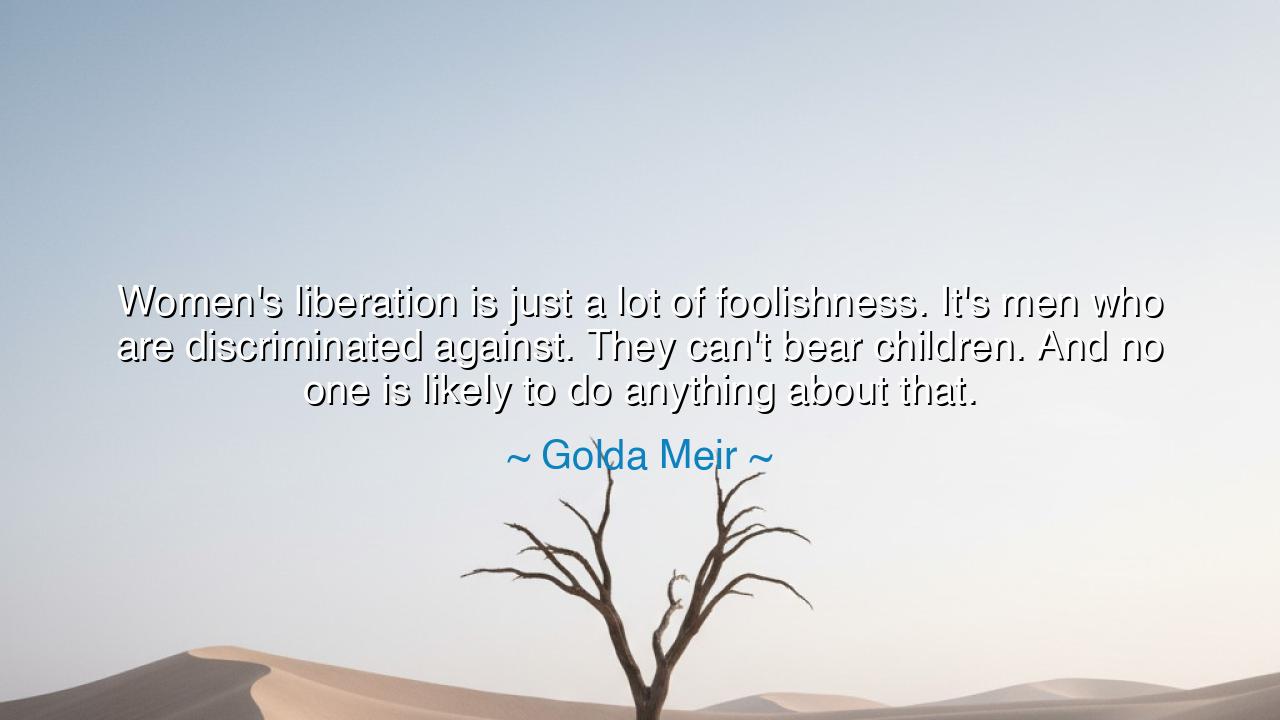
Women's liberation is just a lot of foolishness. It's men who are
Women's liberation is just a lot of foolishness. It's men who are discriminated against. They can't bear children. And no one is likely to do anything about that.






In the grand dance of life, where the roles of men and women have been debated and defined throughout the ages, the words of Golda Meir strike with a sharp and provocative clarity: “Women’s liberation is just a lot of foolishness. It’s men who are discriminated against. They can’t bear children. And no one is likely to do anything about that.” These words, though controversial, challenge us to reflect on the nature of equality, power, and the distinct roles that men and women play in society. Meir, one of the great women of history herself, understood the complexities of life, the strengths and limitations that both men and women face in the world, and perhaps more importantly, the deep human longing for fairness and recognition.
The ancients knew well the balance between the masculine and the feminine. The Greeks, for example, did not see men and women as opposites, but as partners in the great cosmic dance of creation. Aristotle wrote of the natural roles of men and women, observing that while women had power in the creation of life, men held strength in battle and governance. This was a time when gender was seen less as a matter of liberation and more as a matter of natural order. However, the wisdom of the ancients also reminds us that all roles, whether masculine or feminine, come with their own burdens. The women who brought life into the world did so with pain and sacrifice, while men, who were free of such responsibilities, carried the weight of societal expectations that came with their strength.
Golda Meir’s words, though sharp, reflect a recognition of this balance and perhaps an irony that has been lost in the modern push for gender equality. She was, after all, a woman who had risen to the highest office in the land, a leader of Israel, and a symbol of strength and resilience. Yet, in her view, the narrative of women’s liberation overlooked the sacrifices and limitations that men face—limitations that come with the absence of the gift of motherhood, the absence of the ability to create life through their own bodies. While society celebrates women’s ability to bear children, few acknowledge the struggles and sacrifices that men face in the absence of this profound and uniquely feminine role.
Consider the stories of ancient warriors who, in their fierce battles, were often called upon to display valor and strength, yet also knew the pain of knowing they would never experience the role of a mother. The Samurai of Japan, for instance, were revered for their discipline and honor, but their legacy was often marked by their inability to be part of the nurturing that life required. They fought battles not for the glory of war, but out of a sense of duty and a belief in duty’s importance. Their sacrifice was not in childbirth but in the battlefields of their own souls, where they found themselves giving up a different kind of creation: the ability to raise and nurture life through their own flesh.
As Meir alludes, the challenges and struggles of men and women are not always as simple as the idea of discrimination based on gender. The ancient world was filled with men and women who were bound by the roles that society, and sometimes nature, placed upon them. Cleopatra, one of the most powerful women in history, wielded her political and diplomatic skills in a world where women were often seen as pawns, yet she knew that her power was defined not just by her intellect, but by her ability to maneuver within the established patriarchal systems. Similarly, Julius Caesar, the great Roman general, though immensely powerful, was burdened by his own role—one that demanded sacrifice, leadership, and the inability to turn away from the expectations of history.
The lesson that Golda Meir offers, though provocative, calls us to a deeper understanding of equality—an understanding that goes beyond simply advocating for one gender at the expense of the other. Equality does not mean diminishing the importance of the roles that each gender plays, but rather recognizing the value and sacrifices inherent in both. Women’s liberation, while significant in its own right, cannot exist without acknowledging the burdens men also carry. It is through mutual recognition—understanding the pain of each, the unique gifts and limitations—that we can move toward true equality, one that honors both men and women for what they bring to the world.
As we move forward into our modern lives, let us not focus solely on liberation for one gender, but instead work towards a world where both men and women are recognized for the strengths, sacrifices, and challenges they face. Equality is not a battle between the sexes; it is a call for understanding, for balance, and for the honoring of each individual, regardless of their gender, for the roles they play in the world. Let us learn from the ancients, from the wisdom of Meir, and from the realities of both masculine and feminine experience, that true empowerment lies in the ability to see each other’s humanity and to work together for a better world.






AAdministratorAdministrator
Welcome, honored guests. Please leave a comment, we will respond soon